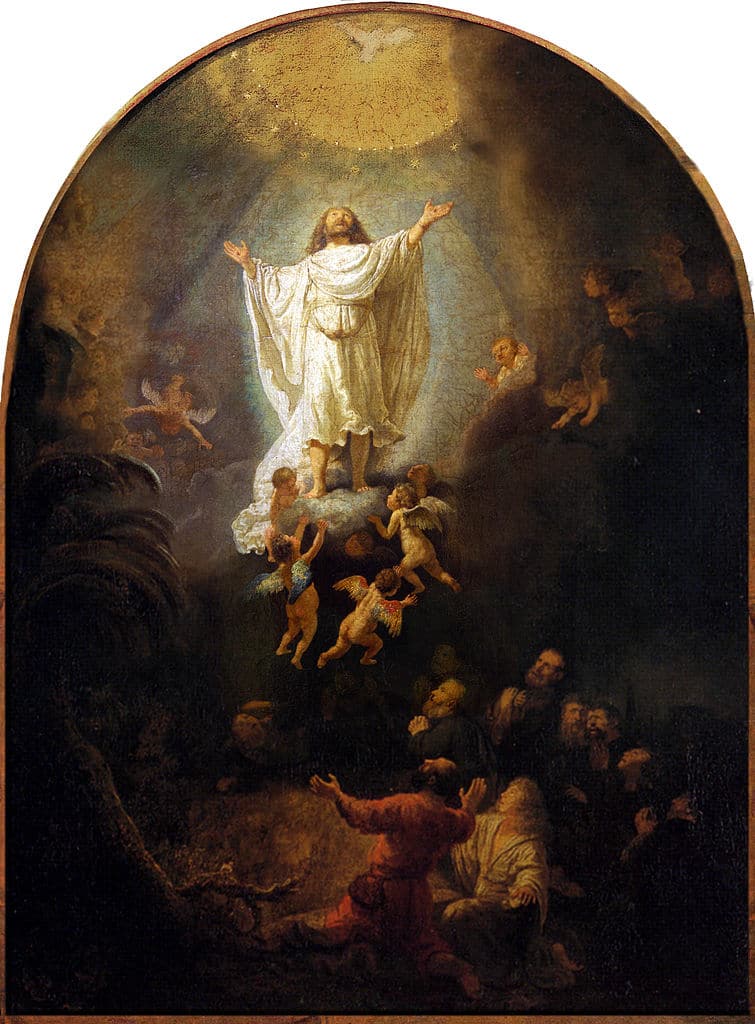Today is Ascension Day. Here’s why it’s significant
On May 26, 2022, believers around the world celebrate Ascension Day.
by Evelyn Choo // May 25, 2022, 10:49 pm

Jesus' Ascension is an important event in Christian history. So why don’t we accord it as much significance as we do the Crucifixion and the Resurrection? Photo by Thgusstavo Santana on Pexels.
Imagine with me for a second: It is the beginning scene in Acts 1. The disciples are on the Mount of Olives, jostling to draw near to the resurrected Jesus.
“He was buried, now He’s here,” one disciple whispers to another in wonder.
In the 40 days since His resurrection, Jesus had appeared to the disciples, inviting them to feel His physical body, complete with the marks in His hands and His pierced side (John 20:26-29).
But there is something still greater to behold.
The Ascension of Jesus is as significant as it is glorious.
After a short exchange with the disciples, we read in Luke’s account that He is lifted up to the heavens and shrouded in a cloud. Jesus’ departure from the physical world culminates in this epic moment.
Picture with me the stupor on the disciples’ faces. Who wouldn’t be stunned?
The Ascension of Jesus is as significant as it is glorious. It is a pivotal moment in the biblical salvation narrative and has been commemorated since the 4th century.
On the Christian calendar, it is typically marked on a Thursday, 40 days from Resurrection Sunday. Today, the event is still observed by Catholic and Orthodox churches, but Protestant churches have largely abandoned the tradition.
Here are five reasons why the Ascension deserves our attention as a major biblical event.
#1 Jesus’ Ascension signified the completion of His work on earth
The mission was clear: Save God’s people by being the ultimate sacrifice for their sins.
Defying the time-space continuum, He ministers to us lovingly and intimately through the Holy Spirit’s presence.
Jesus entered our world fully God and fully man, and He departed from us in the same way.
While the Bible is peppered with accounts of individuals being brought back to life from death, they eventually died a second time.
Jesus, however, ascended in His eternal, resurrected body.
The Ascension was a fulfilment of Jesus’ prophecy before the Jewish council on the night He was betrayed: “… you will see the Son of Man seated at the right hand of Power, and coming with the clouds of heaven.” (Mark 14:62)
Our Saviour accomplished the work that He was called to do (John 17:4), and it was indeed time for Him to be enthroned with His Father in heaven.
#2 Jesus is now accessible to us all
In taking on human flesh, Jesus was bound by space and time. Had he remained on Earth in His physical body, He would not have been able to minister to His disciples as they embarked on missions in various continents.
Instead, Jesus departed from the material universe and entered the heavenly realms.
He is now accessible to us all.
Defying the time-space continuum, He ministers to us lovingly and intimately through the Holy Spirit’s presence.
#3 Jesus is now King and High Priest
As the ascended King, Christ is now sovereign over all creation. All authority has been given to Him (Matthew 28:18).
We can live our lives with profound peace, knowing He directs the past, present and the future.
As a heavenly High Priest who experienced humanity, Jesus displays divine compassion as He intercedes for us.
Theologian Ian Paul says this of our great intercessor: “In the incarnation, God entered into human existence. In the Ascension, that humanity is taken up into the presence of God. We have a High Priest interceding for us who is not unable to sympathise with our challenges, dilemmas, suffering and weakness.”
We are able to worship Him and pray to Him with confidence.
#4 The Ascension paved the way for us to be Christ’s body
“Lord, will you at this time restore the kingdom to Israel?” Wide-eyed and convinced that Jesus was the messianic king, the disciples were desperate to get in on His big plan.
Little did they know, Christ’s mission of restoration would be carried out on a universal scale.
In their earnest but partial understanding, they might have thought that the “plan” was to finally restore the kingdom of God to Israel, elevating the nation to its former glory and political stature.
Little did they know, Christ’s mission of restoration would be carried out on a universal scale.
Jesus’ parting words with His disciples were: “… you will receive power when the Holy Spirit has come upon you, and you will be my witnesses in Jerusalem and in all Judea and Samaria, and to the end of the earth.”
Soon after His Ascension, the day of Pentecost arrived.
Thus began the Church’s God-given mandate to represent Him to the ends of the earth.
#5 The Ascension leaves us yearning for Jesus’ victorious return
When Jesus ascended, two angels assured the disciples that He “will come in the same way as you saw him go into heaven”. (Acts 1:11)
The Ascension reminds us of the “already but not yet”. While He now reigns in heaven, we are still looking forward to His return, when death will be swallowed up in victory and all things will be made new.
In the same way He lives in His resurrected flesh, we too will have perfected bodies. We are awaiting the sound of the trumpet, when the dead will be raised imperishable. (1 Corinthians 15:52)
What do these truths mean for us today?
Everything changed
The Ascension is an important event in Christian history. The disciples witnessed the phenomenon and thought it imperative to account for it.
So why don’t we accord it as much significance as we do the Crucifixion and the Resurrection?
Could our reluctance stem from how classic Western artists have portrayed the scene? In many interpretations, Jesus is depicted as travelling vertically to heaven, positioned to be right above Earth. For example, Rembrandt’s interpretation of the Ascension is epic, and rightly so. It is dramatic and exuberant, quintessential of 17th century Baroque art.

Rembrandt’s “The Ascension” is dramatic and exuberant, but does this depiction inspire us or disturb our logic-driven notions of the heavenly realm? “The Ascension”, Rembrandt, 1636, Alte Pinakothek, Munich. Picture from public domain.
Do our minds process these paintings – and the Ascension – with apprehension? Modern science has long disproved Ptolemy’s geocentric model, in which Earth is at the centre of the universe and heaven is directly above us. This would explain Jesus’ Ascension to heaven quite literally, alas, we no longer believe the model to be true.
But in wrestling with the minutiae, I wonder if we are limiting the grandeur and significance of our Saviour’s coronation. Jesus is sovereign over all creation. Shouldn’t we look up to Him figuratively and oftentimes literally?
Jesus’ Ascension changed everything. It transformed the way He relates to mankind. It clarified our precious calling in the already-but-not-yet.
We now have the definite expectation that He will one day return.
Until then, we look up and ahead – not in stupor, but with confidence.
RELATED STORIES:
“Times like this reveal whether our inner core is built on sand or rock”: Dr Goh Wei Leong
We are an independent, non-profit organisation that relies on the generosity of our readers, such as yourself, to continue serving the kingdom. Every dollar donated goes directly back into our editorial coverage.
Would you consider partnering with us in our kingdom work by supporting us financially, either as a one-off donation, or a recurring pledge?
Support Salt&Light


